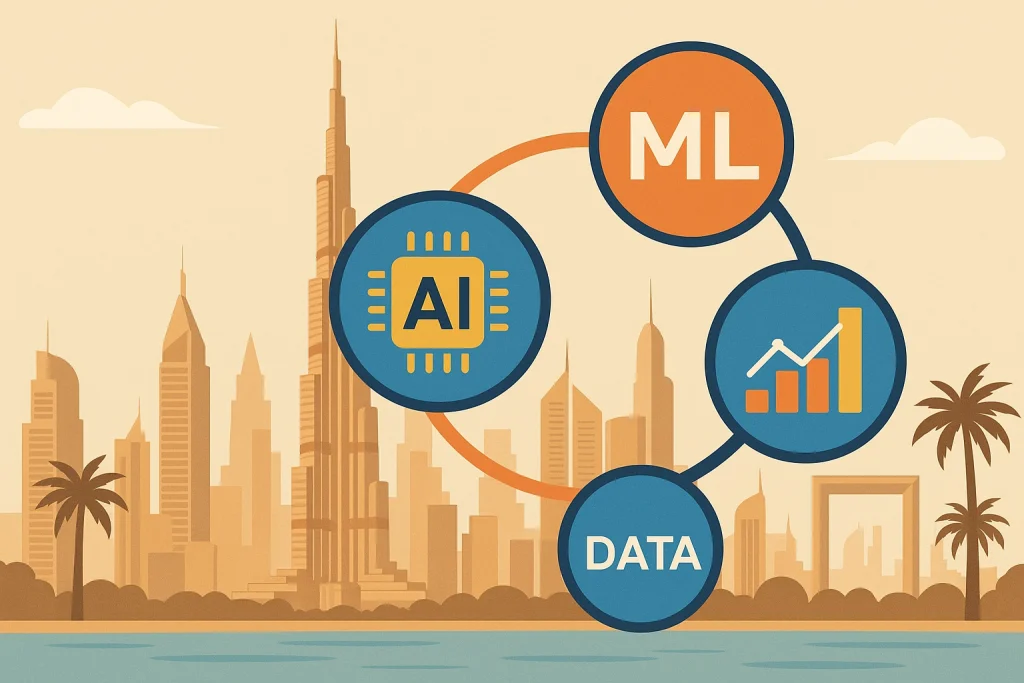The UAE job market is undergoing a significant transformation, driven by ambitious economic diversification, major infrastructure projects, and a rapid embrace of digital technology. By 2026, the employment landscape for both blue-collar and white-collar professionals will look fundamentally different. The most pronounced shift is a surge in demand for skilled blue-collar workers to deliver on large-scale construction and logistics projects, coupled with a redefined focus for white-collar talent toward niche, high-expertise roles in technology and specialized finance. Success hinges not just on finding a job, but on understanding where the real, future-proof opportunities lie within Dubai and Abu Dhabi's rapidly maturing economy.
Why is Demand for Blue-Collar Jobs Increasing in Dubai and Abu Dhabi?
Demand for skilled blue-collar jobs is experiencing a notable surge, primarily driven by the UAE's continuous investment in mega-projects and infrastructural development. This sector, which includes construction, manufacturing, logistics, and hospitality, has shown remarkable growth, necessary for realizing the nation's 2030 and 2040 urban plans. The core reason for this growth is the UAE’s long-term economic strategy moving beyond oil and solidifying its position as a global trade, tourism, and technology nexus.
What Construction and Logistics Jobs Are in High Demand in the UAE?
The backbones of the current blue-collar surge are construction and logistics management. The continuous development in Abu Dhabi and Dubai necessitates a high volume of skilled laborers, site supervisors, certified electricians, specialized plumbers, and heavy-vehicle drivers. Furthermore, the UAE's role as a global trade and logistics hub means that warehouse management, supply chain operations, and port activities are consistently generating vacancies. These roles require demonstrated vocational competence and certification. see -> How Can I Find a Driver Job in Dubai with a High Salary?
What is the Average Salary for Skilled Blue-Collar Workers in the UAE?
The salary for blue-collar workers in the UAE varies significantly based on skill level, industry, and whether the employer provides benefits like accommodation and transportation. On average, unskilled workers might earn between AED 900 to AED 1,200 per month. However, skilled laborers such as certified technicians, foremen, and heavy-duty drivers typically command higher salaries, often in the range of AED 1,800 to AED 3,500 per month, plus substantial benefits which significantly increase the overall compensation value.
Go to our free AI Salary Checker for accurate insights into what professionals in these fields actually earn in the UAE market.

How is AI and Automation Affecting White-Collar Jobs in the UAE?
AI and automation are not eliminating white-collar jobs entirely in the UAE, but they are undeniably redefining them, pushing the market toward roles that require critical thinking, strategic planning, and human-centric skills. Repetitive, data-intensive tasks are being streamlined by AI, which is enhancing, not replacing, senior professional roles. Experts suggest AI adoption will take five to ten years to cause major disruption to senior management, but the impact is already being felt at junior levels. If your looking to get in early read our Top In-Demand Tech Roles in Dubai 2026
What White-Collar Roles Are Most at Risk of Automation by 2026?
Roles that are heavily focused on repetitive data entry, routine administrative tasks, basic financial processing, and junior-level back-office support face the highest risk of disruption. AI tools are becoming highly effective at handling these processes, leading companies to centralize and automate functions for efficiency and cost reduction. This shift means that entry-level and mid-level professionals need to quickly upskill in complementary technologies to remain competitive and avoid being streamlined out of a role.
What are the Most In-Demand White-Collar Professions for 2026?
The most in-demand white-collar professions for 2026 are specialized roles created by the UAE's push into future economies and its strategic national programs.
- Artificial Intelligence and Machine Learning Specialists: Experts who develop, implement, and optimize AI models are in high demand, reflecting the UAE's ambitious national AI program.
- Cybersecurity Experts: As digital infrastructure expands across the government and finance sectors, professionals securing these systems are critically needed.
- Fintech and Regulatory Compliance Officers: Specialists with expertise in financial services regulations, Anti-Money Laundering (AML), and blockchain are essential as the UAE grows as a global financial hub.
- Renewable Energy Engineers: Professionals focused on Green Technology are needed to support major sustainability initiatives, including solar and smart grid development.
Learn more about emerging tech opportunities through our Tech Startup Jobs in Abu Dhabi guide and the Best-Paying AI & Data Science Jobs in Abu Dhabi.

What are the Key Skills Needed to Thrive in the UAE Job Market?
To secure a high-value position in the 2026 UAE job market, both blue-collar and white-collar jobseekers must focus on acquiring a blend of technical and human skills. The market demands demonstrable, specialized competence that directly contributes to the nation's strategic growth areas.
What Technical Skills Are UAE Employers Prioritizing Now?
For white-collar roles, the priority is digital mastery:
- Advanced Data Analytics and visualization skills for generating strategic insights.
- Cloud Platform management and deployment expertise (e.g., AWS, Azure).
- Agile Methodology and Project Management Professional (PMP) certification, especially in technology and construction.
For blue-collar roles, certified specialization is key for higher earnings:
- Advanced diagnostic and maintenance skills for automated machinery.
- Heavy Equipment Operator licenses and safety certifications recognized internationally.
- Digital literacy for interacting with modern logistics and inventory management systems.
How Important are Soft Skills in the UAE's Diverse Workforce?
Soft skills are paramount in the diverse, international environment of the UAE, where collaboration across cultures is the norm. Employers consistently prioritize:
- Cross-Cultural Communication and Emotional Intelligence: The ability to work effectively with multinational teams and clients.
- Adaptability and Lifelong Learning: Essential for navigating the fast-paced, constantly evolving business landscape and adopting new technologies.
- Complex Problem-Solving: Skills that cannot be easily replicated by current AI and are necessary for strategic leadership.
You can streamline your application process and articulate these soft skills effectively by using our AI Cover Letter tool.

How Do Government Policies Shape Career Opportunities in the UAE?
The UAE government actively shapes the labor market through strategic initiatives and flexible visa reforms, making it easier for skilled professionals to enter and stay in the country. This provides a clear framework for long-term career planning.
What is the Impact of Emiratisation on the Job Market?
The Emiratisation policy mandates an increasing number of UAE nationals in skilled private sector jobs. This creates significant opportunities for citizens in critical sectors like banking, finance, and technology, backed by training programs like Nafis. For expatriates, this often means focusing on highly specialized or senior technical roles where the local talent pool is still developing, particularly in niche tech areas. Expatriates must demonstrate unique global expertise.
What are the Key Visa Options for Skilled Expats in the UAE?
The UAE has introduced several attractive long-term visas to draw in global talent, providing residency without needing traditional employer sponsorship in some cases:
- Golden Visa: Offers 5 or 10 years of residency for investors, specialized talents (like scientists, doctors, and coders), and outstanding students.
- Green Visa: Offers 5 years of residency for skilled workers, freelancers, and investors, providing more flexibility in career transitions.
These programs demonstrate the UAE's long-term commitment to attracting and retaining the best global talent in a highly competitive global market. -> How to Get a Visa Sponsorship Job in the UAE

Frequently Asked Questions (FAQ)
You must tailor your resume to the job description, focusing on quantifiable achievements and relevant keywords. Since many UAE companies use Applicant Tracking Systems (ATS), you should use an AI Resume Builder to ensure your application passes the initial digital screening and highlights your specialized skills.
The main difference is in the nature of growth. Blue-collar growth is driven by volume and the physical requirements of major infrastructure and trade projects. White-collar growth is driven by value, focusing on high-skill, niche expertise in technology, finance, and governance required for the strategic, future economy.
Yes, the UAE actively encourages remote workers and digital nomads through specific visa programs. Professionals can apply for the Remote Work Visa which allows them to live in the UAE while continuing to work for their employers outside the country. This flexibility supports the growth of the gig and freelance economy within the UAE.
Conclusion and Next Steps
The UAE job market in 2026 presents a clear mandate for job seekers: specialize, certify, and adapt. There is robust, immediate demand for highly skilled labor in the infrastructure sector, and a strategic, high-value demand for white-collar professionals who can drive technological innovation. Generic roles are diminishing; the future belongs to those who possess deep, certified expertise and the human skills to leverage technology effectively.
Ready to secure your specialized role in this dynamic market? Start your search today for jobs in Abu Dhabi, Dubai, and across the UAE and leverage our innovative AI tools to gain a competitive edge in your application process.









 2025-10-30
2025-10-30
 2025-10-28
2025-10-28
 2025-10-06
2025-10-06
 2025-10-02
2025-10-02
 2025-09-30
2025-09-30